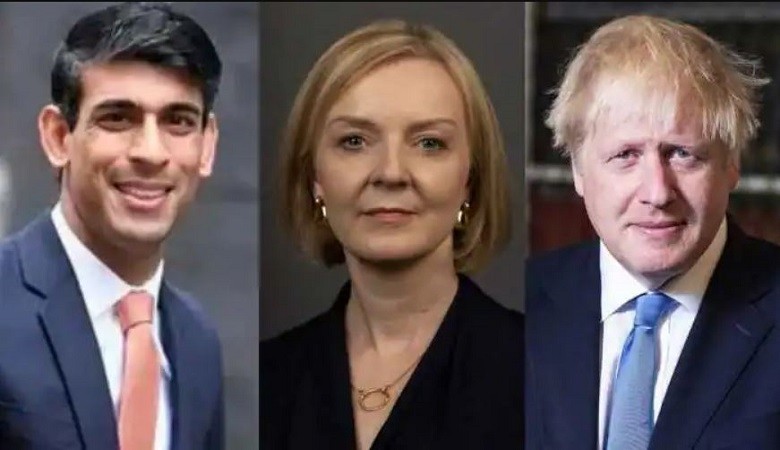
UK: Six weeks after taking office, British Prime Minister Liz Truss abruptly has announced her resignation. The British people has witnessed a lot over the past four months, and the country's political environment has undoubtedly been impacted by the changes of three Prime Ministers, four Chancellors, and a new queen.
Following the reading of a statement outside No. 10 Downing Street on Thursday, Liz Truss announced her resignation as both the prime minister and the head of the Conservative Party. She claimed that the reason she was doing it was because she was unable to carry out the mandate for which she had been chosen as the Tory leader only 46 days prior.
Her 44-day term ends with this, making it the shortest ever for a British Prime Minister. Before the last act, there was a time when the Conservative Party members engaged in backstabbing and internal strife, made immature and unworkable decisions, and took the British public for granted.
The scenario essentially played out as it did in the final days of the previous prime minister, Boris Johnson. The resignation of BoJo's chancellor, Rishi Sunak, was the catalyst for the crisis, whilst Suella Braverman's resignation as Truss's home secretary caused the problem to worsen.
The turbulent days Truss, who took office on September 6, promised the electorate that her administration would "ride out the storm" with them and that she would do all in her power to reduce living expenses, including setting an energy price cap for the following two years.
But when she presented a mini-budget on September 23, her chancellor Kwasi Kwarteng completely shook the markets. Among his recommendations were proposals for the government to borrow about 2 billion pounds yearly and the elimination of the 45 percent tax on earnings over 150 000 pounds.
The UK's not-so-mini fiscal plan, which was meant to spur economy there, alarmed investors and caused the pound to drop to historic lows against the US dollar. The decline of the pound led to greater import costs and worries about rapidly rising borrowing expenses.
Additionally, it compelled the Bank of England to take immediate action, pledging to buy 65 billion pounds' worth of bonds to stabilise the gilt markets following a sell-off that is scheduled to expire on October 14.
As a result of her unsustainable tax and spending plans, as well as the fact that her mini-budget was unfunded, investors and the market lost faith in the UK economy. Truss's mini-budget was perceived as being unduly aggressive.
Truss fired her Chancellor in an unethical manner to erase the harm, and she reportedly claimed that she had to do it to protect her own skin.
On October 14, she pulled another rabbit out of her hat when she abruptly fired her chancellor Kwasi Kwarteng, who had been called to leave early from the yearly IMF session in Washington.
Kwarteng was succeeded by Jeremy Hunt, who did a complete about-face and largely scrapped all of his predecessor's initiatives. Her humiliation was therefore complete with this. Her political savvy and public image both suffered greatly.
Another setback occurred when her Home Secretary Suella Braverman quit on October 19 after vehemently retracting her claim that Indians were the UK's greatest visa overstayers. This, along with other relevant concerns, raised questions about whether the Free Trade Agreement (FTA) with India would be finalised before Diwali, a promise that was frequently made by both BoJo and Truss.
However, the financial markets were truly the ones that dictated the downfall of her flimsy leadership. When her terrible "growth plan" was made public in September, investors reacted angrily.
Then who? The election process to choose the new Tory leader and prime minister has begun, and Graham Brady, the chairman of the Conservative Party's 1922 Committee, will likely play a significant role in it. Brady claims that a more expedited election process might produce a decision by next Friday. While Rishi Sunak, Boris Johnson, and Penny Mordaunt are all considered potential candidates, current Chancellor Jeremy Hunt has declined to run.
Even though Rishi appears to be the bookmakers' current favourite, his views appear to be more in line with market forces, and it is unlikely that he would show any remorse for Britain's failing social care, health, and public housing systems. Ben Wallace, the secretary of international trade, Kemi Badenoch, James Cleverly, and Braverman are some further candidates.
An overview of what takes place next: After Liz Truss' abrupt resignation as UK prime minister with 45 days remaining after entering office, candidates have a few days to secure the backing of MPs.
Candidates must receive support from at least 100 MPs in order to be considered once the nomination period closes on Monday at 2 p.m. Although no one has officially announced their candidacy, Rishi Sunak and Penny Mordaunt are thought to be competitors.
Sources close to the former prime minister Boris Johnson decline to confirm or refute rumours that he is considering running. On Thursday, Truss announced her resignation as prime minister. Speaking outside Downing Street, she claimed she was unable to fulfil her campaign promise.